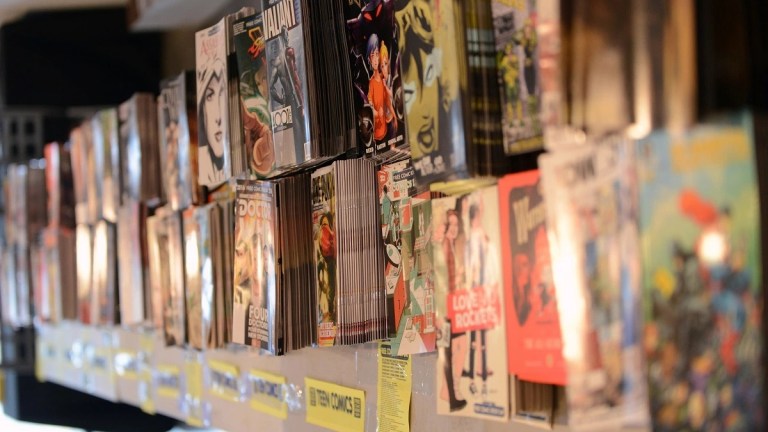What Does DC Comics Leaving Diamond Mean for the Future of the Industry?
DC Comics is leaving Diamond entirely. What does it mean for comics? And what does it mean for you?

Diamond Comics Distributors had what amounts to a monopoly on comic book distribution in North America for more than 20 years, so when DC Comics stood up two competitors after COVID shut down shops and warehouses around the country, it was enormous news. Now, DC announced that it is severing its relationship with Diamond entirely, distributing their books through those new companies, Lunar Distribution and UCS Distributors. What does this mean for regular comics readers? And what might this portend for the industry? Let’s take a look.
SO WHAT’S ACTUALLY HAPPENING?
Diamond Comics Distributors has functionally been the only comic distribution service in North America since 1996. They publish Previews magazine, where the solicitations for new books are every month, and they’re the organization that all comics shops order their product from. They’ve been the subject of countless hours of kvetching from comic shop owners over the years, from complaints about orders being wrong to poor shipping practices and everything in between. But they’ve also been a source of great stability – even when they screw things up, they screw them up in predictable ways.
Diamond is part of Geppi Family Enterprises, a holding company that also operates similar nerd-oriented businesses, like Diamond Select Toys, Diamond UK (handling European and UK distribution), Alliance Game Distributors, and others.
Diamond had exclusive deals with all the major comics publishers for distribution. They worked as a middleman in the transaction – you would order your books from your shop, the shop would order them from Diamond, Diamond would put the bulk orders in with the publishers. The publishers would print them, send them to Diamond, who would package the books up and get them to shops, and the shops would drop the books in your pull box. You’d pay your shop, the shop would pay their Diamond invoice, and Diamond would get the money to publishers.
That changed with the onset of the Coronavirus pandemic. When the pandemic hit, Diamond told publishers they wouldn’t accept new books at Diamond’s warehouse, and ceased payments to publishers. Two weeks after the halt in shipping, Diamond told publishers that they would only be sending 25% of their payments for six weeks, then spread the balance out over the next quarter.
It’s not clear if this move was related to DC’s decision. In April, DC announced that they would be coming back before Diamond started shipping again, this time by putting comics out to shops through two new distributors, UCS and Lunar Distributing. Lunar, owned by online back issue shop DCBS, distributed to the western portion of the United States, and UCS, owned by New York City based megashop Midtown Comics, would handle the eastern half.
Then DC announced it was pulling out of Previews. This was another sign that something big was changing – Previews is the monthly catalogue for comics publications and merchandise. Marvel and DC had pull outs within Previews, but many shops bundle them together and they all used the same order coding to select books. Changing that sent a strong signal that there were more changes to come, and that shoe finally dropped with the announcement that DC was terminating its relationship with Diamond.
OmG pRiNt CoMiCs ArE dEaD!!!1!1!!
Excellent use of the sarcasm font, disembodied rhetoric.
No, print comics are not dead. To start with, it makes absolutely no sense for DC and two of the largest retailers of print comics in the country to start up new print comics distribution ventures with the express intent of turning around and shuttering 100% of their core business model. That’s just silly.
That said, it is a big change with very little time from announcement to implementation. And probably the most reasonable demand from business owners in any industry is predictability: change is mostly fine, provided there’s ample time to plan and implement, and every business owner I know values a regular, routine business interaction over periodic swings, even if the swings are really good. This upends 20 years of business practices in the middle of the steepest economic downturn the United States has ever seen. There are retailers that are angry with the change, like Dan Degnan of South Side Comics in Pittsburgh. “A shortsighted rushed move by DC,” he calls it. He’s most concerned with the “…lack of point of sale interfacing, no plan for international accounts, immediate burden on new [distributors] to field a massive volume of questions and concerns, and pulling August solicits after releasing are just a few of the ripple effects. Another source of freight costs will dig into retailer’s thin margins too. I’m ok with marketplace competition but DC needs to play the game within the constructs of the [direct market].”
Then there are the shops that are upset at how it went down but happy with the idea of it. “DC switching distributors is a pretty big move, don’t get me wrong, but shouldn’t really affect most stores or customers. We all use multiple distributors for all sorts of other lines of products, and this is just another order form to fill out,” says Ryan Higgins of Comics Conspiracy in Sunnyvale, California. “There’s obviously some concern that DC knows something we don’t and Diamond Comics might not be around much longer, but we’ll cross that bridge if and when it comes. I’ve had a great relationship with Diamond through the years and they’ve always worked with stores to keep them afloat and keep the industry going.”
The most concerning category are the shops that aren’t saying anything, because they closed unexpectedly in mid-March and won’t ever open back up. They, more than behind the scenes distributor wrangling, are the most potent worry for the comics industry.
WHAT DOES THIS CHANGE MEAN FOR ME?
At the moment, if you are a United States resident, the only major systemic difference for you picking up your comics at the shop is that DC books are available on Tuesdays.
The last time something like this happened was, oddly enough, the inciting event behind Diamond’s monopoly. Marvel bought HeroesWorld in the mid-90s, then one of the larger of several comics distributors, with the expectation that they’d be rolling in cash from all those sweet, sweet X-Men #1 reprints moving around. That…did not happen. The speculator market collapse pushed Marvel into bankruptcy, and retailers were already pretty pissed at how grossly incompetent HeroesWorld was at shipping books. Eventually, everyone ended up with Diamond, giving them a de facto monopoly.
That may happen again, but it’s worth noting that while Midtown has an enormous footprint in New York City for physical comics sales, they also have a robust online operation, and DCBS is an entirely online comic shop. Both have a lot of experience with the logistics behind sending comics to disparate corners of the country.
That may not be the case overseas – neither Lunar nor UCS ships abroad, and it’s my understanding that this severing of the deal with Diamond also includes Diamond UK, so comics distribution there may take a little longer. And the ordering process is likely going to be more onerous for shop staff now that they have to order from two separate systems. And while Diamond’s system is reportedly pretty shitty, even if the USC/Lunar systems are easier to navigate, shop owners will still have to use both.
But you should still be able to go to your shop on Wednesday (or Tuesday) and pick up your books, and this change won’t affect which books are going to your shop or how many books DC or Marvel is putting out.
WHAT DOES THIS MEAN FOR DIAMOND?
Despite what Diamond CEO and repeated thirst trap victim Steve Geppi would have you believe, it’s probably not great.
According to Comicchron sales data, DC accounts for about 30% of total comic book market share. That all goes through Diamond. To have 30% of your business up and disappear is probably not helpful or conducive to the long-term health of your business.
Furthermore, there’s reason to believe that everything at Diamond wasn’t peaches and cream before the pandemic. In a Facebook post quoted by The Beat, former DC President Diane Nelson strongly implied that Diamond as a business was teetering. “I can say purely as a private individual that Diamond has, for a long time, been unwilling or unable to modernize and support and grow the biz as needed for a healthy direct channel. And may not even be solvent,” she said.
However, John Jackson Miller, the industry analyst at Comichron, has an interesting theory: Diamond could become a back issue clearinghouse. “…a nonreturnable comic book becomes a back issue the second it reaches a retailer’s store,” he says. “There’s nothing stopping Diamond from obtaining DC comics on the secondary market in bulk and making them available to other retailers.” Which would make Diamond remarkably similar to two other big names in the comics biz: DCBS and Midtown Comics.
For more on changes to the comics marketplace, including a full listing of my ebay auctions for back issues (who wants some X-Cutioner’s Song! The bags are all open!), stick with Den of Geek!
